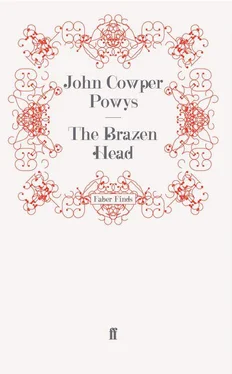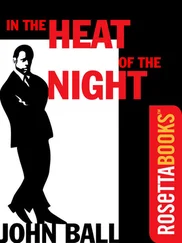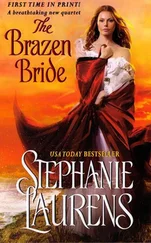But after making this appeal to the Mystery at the back of all life, Roger Bacon closed his eyes with such a peaceful sigh that it was clear that he himself felt perfectly satisfied with his little private interview with his creator.
The Friar’s descent, or ascent shall we say, into the blessed land of oblivion, now gently and deliciously invaded by the feathered dreams of sleep, was soon disturbed however by a resolutely firm and yet cautiously light knocking at the door, a knocking which did not wake him at first, but mingled with his dreams, and mingled with them in such a curiously prophetic manner that he became vividly aware, even before he awoke, of the personality of the intruder, who was none other than his faithful friend and devoted adherent of a great many years, his servant Miles.
Miles and he had indeed been young men when their association first began, and Miles always absolutely refused to be known by any other name than this Roman word for a soldier. Miles came from the old Roman town of Durnovaria, a town which the people of Wessex had already begun to call Dorchester, just as the older name of Friar Roger’s own ancient market-town had recently come to be changed into Ilchester.
Yes! His waking dream had not misled him. There, in the fading, late-afternoon twilight, when he went to the door and opened it, standing erect on the threshold, was his friend, his man, his devoted under-study, his partner, his disciple, his obedient slave, his servitor, his alter ego, Miles of Dorchester!
“ Master !” cried Miles in an ecstasy of joy; and flinging his hawk-feather cap into the middle of the room, he fell upon his knees, clasped the Friar tightly round the waist, and pressed his forehead hard against his hero’s navel.
“There, there, there!” murmured this latter reassuringly and tenderly, and very much in the tone with which a responsive dog-lover would soothe a majestic, over-emotional, over-sensitive wolf-hound; and as he spoke he raised Miles to his feet, led him across the floor incidentally picking up the man’s hawk-feather cap and handing it to him as they went, and seating him in the chair recently occupied by Ghosta, sat down opposite to him and laid his two clasped fists upon his page with the air of one who has decided to substitute some different form of urgent pressure for the one associated with pens and parchment.
One remarkable peculiarity of the man Miles was the way his countenance altered in a moment from a majestic, monumental, and commanding reserve, not unmixed with an astute alertness that had in it something of the primeval and bottomless cunning of a simple animal, into a melting abandonment to an emotion of devotion so extreme that it was almost painful to witness.
The Friar pressed his hand on the man’s shoulder as he himself got up again to set before them both some wine and a couple of goblets. Then, when the Dorchester-born warrior, who, while lifting his glass, looked, with his massive neck and his clear-cut profile, distinctly like a well-known bust of Caesar Augustus, had rested and refreshed himself a little, the Friar put the straight question to him, “Well, old friend,” he enquired, “and what’s the news?”
“He’s down there now. I left him in the lobby. They are all busy in the kitchen, and the Prior’s begun his dinner. So I left him in that dark entrance on that cushioned seat. He’ll be asleep, I wouldn’t wonder, when I go down to him. Shall I tell them in the kitchen that you’d like him to have his supper up here with you? And that whatever they’ve got for you will do for him too? Shall I tell them that you’d like a bottle or so more of wine and of the best they’ve got? And shall I say that they’d better bring out a mattress for him into the lobby where he is now and a few coverings for it?”
Had Ghosta been there still, or indeed had any feminine being been there, she would not have failed to follow the varying expressions that crossed the Friar’s face as he listened to this speech, and to follow them with growing astonishment. Friar Bacon’s countenance, together with the shape of his head, represented, as any intelligent woman would have recognised at once, or any man either, who happened to be possessed of that sort of visual penetration in which most women leave most men far behind, a perfect example of the pure intellect as it struggles almost always with difficulty, and generally totally in vain, to cope with the irrational changes and chances of human life upon this planet.
The Friar had a delicate face in the precise sense in which all the way down the centuries the word “sensitive” has been used. Anyone could see at one glance that the man was abnormally porous to impressions. And it was indeed clear at this moment that the impressions which reached him from the revelations that this Durnovarian retainer of his was so calmly and relentlessly disclosing were of the most crucial intensity; for little complicated patterns of criss-cross interlinings began to appear on his forehead and under his eyes that resembled frost-marks on an exposed window.
It was only when Miles, having entirely finished what it was his business to report, had permitted his Roman features to assume that patient expectant look of an officer anxious to catch from the lips of his general every faintest nuance of the orders issued, that the Friar realized that their relative positions had been reversed, and that it was himself who was now standing in front of Miles, watching and pondering, and asking, not this unqualified fellow-man, but the inscrutable features of Fate itself, what on earth had to be done now.
What he said, when it came, was pathetic enough in its simplicity. “What do you advise me to do, Miles?”
That this typical Centurion had, from old experience of the master he loved so passionately, expected just exactly this supplication, this appeal to a knowledge of life as it went along such as had nothing to do with learning, was proved by the military decisiveness of his answer.
“I think,” he replied firmly, putting down his glass, and speaking in his calmest and most Roman tone, “that you’d better send me into the kitchen to emphasize this man’s importance, and yet to make it plain that it would be more considerate to Prior Bog to spare him any immediate invasion; at any rate to let us all have dinner in peace before we do anything and before he has to do anything.”
A sigh of relief so deep that it seemed to come from the soles of his sandals shook Friar Bacon from head to foot.
“But you’ll have to bring him up here, I suppose?”
And when Miles nodded to this his master accepted it as if it were the word of destiny, escape from which would be hopeless.
“Very well,” he conceded. “Bring him up; and explain to him that you’ll come up yourself a little later with his meal. We don’t want anyone else up here, do we?” This last sentence the Friar added in what was almost an appealing tone. And Miles, already at the door, answered with a significant shake of his head.
The moments that followed were among the most painful in Roger Bacon’s life. From his habitual loneliness as a scientific prisoner of religion, he had come to be a man of two different worlds; and since each of these worlds required, if he was to deal with it adequately, all the creative power as well as all the destructive power he possessed in his own personality, it was no easy thing to deal with both these worlds at the same time.
It was natural to him to concentrate his attention upon his private world of lonely thought and lonely experiment, and to feel a peculiar kind of nervous suffering whenever it was necessary for him to face the shocks and clashes and misunderstandings of real life.
“And now,” he told himself, “I have to meet the one man in all the world with whom I find it hardest to deal.”
Читать дальше











